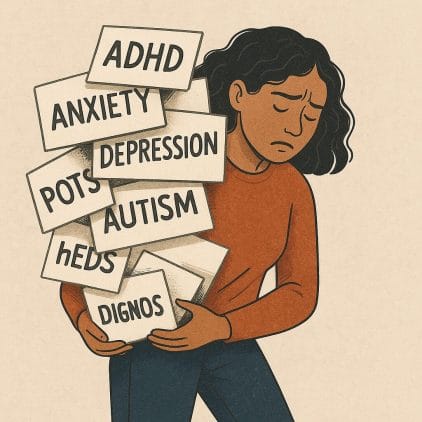
Psychosomatic Illness: How Stress Impacts Your Body and Business Health
- Updated: March 27, 2025
Psychosomatic illness is what happens when emotional stress turns into physical symptoms—and it’s more common than you think.
Hi, I’m Denise G. Lee, a healing and leadership coach. I work with business owners every day who are high-functioning on the outside but silently struggling with health issues that have no clear medical cause. The truth? Many of these symptoms are the body’s way of signaling emotional overload.
Running a business comes with real pressure. Deadlines, decisions, and financial stress can weigh heavily—not just on your mind, but on your body too.
In this article, I’ll explain what psychosomatic illness is, share real-life examples, and offer practical tips to manage stress before it turns into physical distress. Let’s start by looking at how the mind-body connection works—and why your body might be asking for help.
What is Psychosomatic Illness?

Psychosomatic illness is when emotional or psychological stress leads to physical symptoms. The term comes from the Greek words “psyche,” meaning mind, and “soma,” meaning body, highlighting the strong link between mental state and physical health. Symptoms of psychosomatic illness can vary widely, depending on what’s happening in a person’s life.
Holden, for example, struggled with insomnia. Despite taking multiple sleeping pills, he paced his floors nightly, unable to quiet his mind. His insomnia stemmed from the stress of a pending divorce while his business was on the brink of expansion—a classic case of psychosomatic illness. The weight of his responsibilities was too much, leading to physical symptoms that sleep aids couldn’t fix.
In another example, as part of the prayer ministry at my church, I receive requests that are both deeply personal and emotionally heavy. Recently, a particular prayer struck me—not just because of its content but because of the powerful way emotional pain manifested as physical illness. I’ve changed names and details to respect privacy, but this story highlights a struggle that many can relate to.
Rebecca’s Silent Struggle

“My partner is struggling with alcoholism and can be so hurtful. Please pray he finds the strength to get help—it’s my only hope for saving our relationship. I need strength too, maybe even to walk away if he won’t change. I’ve never had a truly healthy relationship, and the stress is wearing on me. I’m tired and in poor health. I recently found out I have a growth in my chest, benign for now. He isn’t supportive in any way, and recently drained our account. Please pray for him.”
Rebecca
Rebecca’s words reveal a profound conflict between her hope for her partner’s recovery and the toll this hope has taken on her well-being. Years of constant stress, of shouldering her own pain alongside an unhealthy relationship, have worn her down. The physical signs—fatigue, tension, even a benign growth—suggest that her body is absorbing her emotional wounds, translating inner turmoil into physical symptoms.
Rebecca’s story reminds us that our bodies aren’t immune to our emotional struggles. Sometimes, the greatest strength we need is the courage to prioritize our own health and healing.
Now, let’s discuss the science behind psychosomatic illness.
The Science Behind Psychosomatic Illness
Stress can really affect your body. One study in the Journal of Investigative Dermatology showed that stress can make skin problems worse by messing up the skin barrier and causing more swelling. That’s why skin conditions like eczema and psoriasis can get worse when you’re stressed.
Another study in the American Journal of Gastroenterology found that stress can make symptoms of irritable bowel syndrome (IBS) worse. The researchers found that stress changes how your gut and brain work together, making IBS symptoms more sensitive and changing how your gut moves.
Psychological Factors at Play
Several things in your mind can cause psychosomatic illness. Anxiety, feeling really sad, and not working through tough times can all show up as physical symptoms. When your brain is always stressed out, it can send signals to different parts of your body, causing pain, discomfort, or other problems. That’s why it’s important to deal with both your mind and body when you have psychosomatic illness.
Unresolved tough times can be a big thing. For example, people who have gone through tough times may have a really strong stress reaction, leading to long-lasting physical symptoms. Many business owners have a high pain tolerance and often don’t seek help until the pain literally prevents them from making money in their business.
The Danger of Too Many Diagnoses

In today’s culture, there’s a growing trend of labeling every discomfort, difference, or dip in functioning as a medical condition. That might sound helpful—after all, names give us understanding, right? But there’s a fine line between naming something and claiming it in a way that keeps us stuck.
I recently read a powerful article by neurologist Suzanne O’Sullivan in The Wall Street Journal about how more and more people, especially young adults, are receiving multiple overlapping diagnoses—often without clear pathology. Diagnoses like PoTS, hEDS, autism, ADHD, and anxiety are being handed out quickly and often based on vague, subjective symptoms. These aren’t always wrong, but the way they’re used can sometimes reinforce the belief that we are permanently broken.
What O’Sullivan and many other clinicians are starting to say is this: We’re turning more people into medical patients when they may actually be dealing with untreated stress, trauma, or emotional dysregulation. In one case she shared, a young woman received so many diagnoses over the years that she no longer believed she could ever be healthy again. Her stress and physical symptoms became part of her identity.
Here’s why this matters for you:
If you’re a business owner constantly under pressure, your body may already be carrying the burden of unprocessed stress. And while it’s tempting to chase medical explanations for every ache or crash, you might be dealing with a psychosomatic pattern that no blood test can detect.
That doesn’t mean your symptoms aren’t real—they are. But the root cause may not be physical. And that’s actually good news, because it means you’re not powerless. Healing becomes possible.
If you’re currently navigating a chronic diagnosis or suspect you’ve been over-medicalized, this isn’t about shame or invalidation. It’s about inviting you to step back and ask:
“What is my body trying to tell me that I haven’t been able to say out loud?”
Sometimes, your healing starts when you stop collecting labels and start listening to your inner life.
Next, let’s discuss signs you are dealing with a psychosomatic illness.
Signs You Are Dealing with a Psychosomatic Illness
Maybe you are not dealing with a sleep disorder or disturbance. The body has a not-so-fun way of alerting you that something is wrong and doesn’t know how to deal with it. Common symptoms include:
- Headaches: Stress can cause tension headaches and migraines.
- Digestive Issues: Stress can lead to stomachaches, nausea, and conditions like IBS.
- Skin Problems: Stress can make skin conditions like eczema, psoriasis, and acne worse.
- Muscle Pain: Chronic stress can lead to muscle tension and pain, particularly in the neck, shoulders, and back.
- Cardiovascular Issues: Long-term stress can contribute to heart disease, high blood pressure, and other cardiovascular problems.
These problems can vary in seriousness, depending on your age, health, ability to bounce back from stress, and how well you manage stress. For instance, someone who has learned to handle stressful situations and has had therapy to deal with trauma might cope better than someone who struggles with controlling impulses and/or has a serious addiction.
Now, let’s explore more about how stress and anxiety can affect both our minds and bodies.

A Real-Life Example
Let me tell you about a client I once had to explain this. She was troubled by constant rashes. Her skin was hot and bumpy, and the itching was so bad that she couldn’t sleep. She had seen many skin doctors and allergy experts, but none could find a long-term fix. Finally, she turned to me for help.
I asked her a simple question: “How do you relax when you’re stressed?” She admitted that she didn’t know how to unwind. This was a big moment. Her body was asking for help because her mind didn’t know how to relax. After working on ways to manage stress, she saw a big improvement in her skin.
Speaking about stress management, next let’s talk about some specific ways you can deal with your stress issues.
The Mind-Body Connection

The mind-body connection is powerful. When you’re stressed, your body releases hormones like cortisol and adrenaline. These hormones prepare your body to deal with a threat, but if they’re constantly elevated due to chronic stress, they can cause a variety of health issues. For instance, high cortisol levels can lead to high blood pressure, a weakened immune system, and even skin problems like rashes.
When you’re under stress, your body enters a state known as “fight or flight.” This is an evolutionary response designed to help you deal with immediate threats. However, in modern life, many of the stressors we face are chronic and not life-threatening. So, if you are not dealing with that excess energy, it can and will hurt your body.
As a result, your body remains in a heightened state of alert for extended periods, which can take a toll on your health. I tell all my clients that you are in ‘cancer training’ if you choose to stay in a stressful situation without finding a way to manage either yourself or how you choose to respond to someone.
Next, let’s talk about another case study of a psychosomatic illness.
5 Tips to Manage Your Stress and Improve Your Physical Health

So, how can you manage stress to improve your physical health? Here are some practical steps:
Tip #1: Pause and Breath
Practicing mindfulness and meditation can help you stay grounded and reduce stress. These practices encourage you to focus on the present moment, which can be incredibly calming.
Why does mindfulness help? Mindfulness involves paying attention to your thoughts, feelings, and sensations without judgment. It can help you become more aware of your stress triggers and develop healthier responses to them. Meditation, on the other hand, involves focusing your mind on a particular object, thought, or activity to achieve a state of relaxation.
Tip #2: Get Moving
Regular physical activity is a great way to reduce stress. Exercise releases endorphins, which are natural mood lifters.
Exercise not only helps reduce stress but also improves your overall physical health. Maybe you want to fit into that outfit that has been hanging in your closet that you refuse to donate and wear one day? Hey, I ain’t mad at you for wanting to look good.
So how much should you exercise? Well, that is up to you and your schedule. My recommendation is to aim for at least 30 minutes of moderate exercise most days of the week. Activities like walking, jogging, yoga, and swimming can be particularly beneficial for stress management.

Tip #3: Eat Better
Eating a balanced diet can help stabilize your mood and energy levels. Avoid excessive caffeine and sugar, as they can increase anxiety.
A healthy diet rich in fruits, vegetables, whole grains, lean proteins, and healthy fats can support your mental and physical health. Stay hydrated, and try to limit your intake of processed foods and sugary snacks, as they can contribute to mood swings and energy crashes. If you need help, don’t hesitate to reach out and talk with a registered dietician or nutritionist.
Tip #4: Sleep More
Make sure you’re getting enough sleep. Poor sleep can exacerbate stress and make it harder for your body to heal.
Aim for 7-9 hours of quality sleep each night. Establish a regular sleep routine, create a relaxing bedtime environment, and avoid screens and stimulating activities before bed. Good sleep hygiene can significantly impact your ability to manage stress. Check out this earlier article I wrote about more tips on getting a better night’s sleep.
Tip #5: Try Therapy or Coaching
Sometimes, talking to a professional can help you deal with emotional issues that might be causing your physical symptoms.
Therapy gives you a safe place to explore and work through the emotions that contribute to your stress. For example, cognitive behavioral or acceptance and commitment therapies can help you recognize and change negative thinking patterns that add to your stress and physical symptoms. If you need help staying on track with healthy habits, a coach like me can support you in reaching your wellness goals.
As a life coach for business owners, I assist my clients in identifying and handling the things that stress them out. Running a business can be very stressful, and it’s easy to forget about your own health. I collaborate with my clients to create plans tailored to their needs that help them manage stress, boost mental health, and, in turn, improve physical well-being.
Well, that’s all my thoughts on this issue. You can see a summary of my tips in the image below.
Next, I’ll share my final thoughts.

Final Thoughts
Don’t let your mind quietly wreck your body. If you’re dealing with physical symptoms that doctors can’t explain, it may be time to explore what stress has been trying to tell you. Healing begins when we stop dismissing the connection between our emotions and our health.
As a healing and leadership coach, I support business owners who are high-functioning but secretly running on fumes. If you’re navigating stress-related health issues, you’re not alone—and you don’t have to power through it. Together, we can build practical, customized strategies to help you feel better—physically, emotionally, and mentally.
🟡 Have you experienced psychosomatic symptoms or are you beginning to connect the dots?
I’d love to hear your story. Click here to send me a message.
Also, explore this article on managing stress or listen to my podcast for more insights on how to care for your mind-body connection.
Note: This article is not intended to diagnose, treat, or prevent psychosomatic illness. Please consult your healthcare provider for medical guidance.





